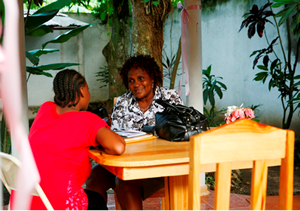Safe Houses Provide Critical Support to Survivors of Violence in Haiti
Date:

“Please, come with me tomorrow. Come with me tomorrow as you did today, with the other teenager?"
This is the plea from 13-year-old Johanne to Monique, a counselor at the Myriam Merlet Safe House in Cape Haitian. They had met at a police station just a few hours earlier, where Monique was helping a 15-year-old orphan, Nadja, who had become pregnant following repeated rapes. Johanne, also a survivor of rape, had been struggling to file a complaint with the police, and was at a loss at who to turn to.
Two years since a catastrophic 7.0 earthquake shook Haiti on 12 January 2010, support to survivors of violence, such as Johanne and Nadja, remains critical in a country re-building itself from the ground up. Responding to the need, UN Women have provided technical support to six safe houses across five regions in Haiti, during this past year.
Supported by UN Women through the programme “Economic Security, Autonomy and Women's Rights, the safe houses provide training to practitioners and counselors, as well as mentoring and clinical supervision. The Ministry for Women's Condition and Rights (MCFDF) has also provided support by establishing standard operating procedures and a manual of norms for safe houses.
The collaboration with the Ministry is critical, as it plays a regulatory role for services provided to women and girls in safe houses at the national level. The operating procedures and the manual targets safe houses, practitioners, counselors and managers, and will be published by the MCFDF. It will allow certification for safe houses, and therefore the quality control of services.
According to Denise Amedee, the main contributor to the manual and director of the Yvonne Hakim Rimpel Safe House, by turning the MCFDF safe house into a training center, the ministry will help build the capacity of future practitioners, strengthening the links and the partnership between them and women's organizations.
These trainings are essential to ensure that every woman, no matter where she lives, has equal access to quality services, including counselling, medical services, the police and the judiciary. For survivors of violence like Johanne, they provide a support system that can allow them to heal, and move forward.
Background: Network of Safe Houses Supported by UN Women
As part of the “Economic Security, Autonomy and Women's Rights programme, six safe houses receive technical support from UN Women. Three of them are run by the Association Femmes Soleil d'Haiti (AFASDA) and provide services in the North, North West and North East regions of Haiti, with support too, from the organization V-Day, founded by Eve Ensler.
Although the two houses in the West region, run by the Ministry and a feminist organization Kay Fanm, have been closed since the earthquake of January 2010, they will soon reopen. Zonta International, a worldwide organization of executives in business, is helping to rebuild the Kay Fanm Safe House. Meanwhile the construction of the sixth house of the network in the South East region will soon be completed, and the Haitian organization Fanm Deside will ensure its functioning and management.